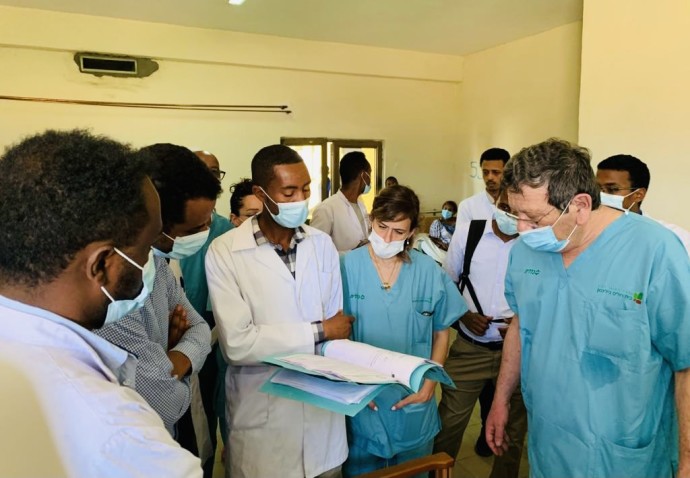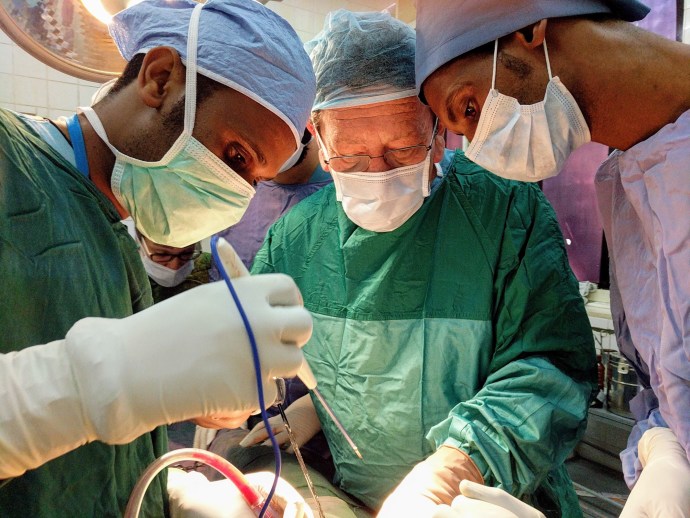When Prof. Hanoch Kashtan visited Ethiopia in 2013, he did not know that the trip would change his professional life forever.
“I used to work very closely with a male nurse who was originally from Ethiopia,” said Kashtan, who recently joined the staff at Samson Assuta Ashdod University Hospital. “He arrived in Israel as a young adult after a month-long journey from Gondar to Sudan by foot. He invited me to accompany him on a trip to reconnect with his roots.”
During the trip, the two colleagues visited a hospital in Bahir Dar, the capital city of the Amhara Region in northern Ethiopia.

“When we entered the emergency room, we saw a person lying on the floor with an arrow stuck in his abdomen,” Kashtan recalled. “I was then amazed to discover that the patient had walked for two days in that condition to reach the hospital.”
The man received the medical assistance that he needed and managed to recover.
“However, he had to undergo open surgery as opposed to minimally invasive surgery, which has been the standard practice in Israel for many years,” Kashtan said. “And after having open surgery, he had to walk for another two days to get home.”
Minimally invasive surgery is an operating technique that involves smaller incisions compared to traditional surgery. It is suitable for patients presenting a variety of conditions. The incisions are known as “ports.” After performing them, the surgeon uses the ports to introduce narrow tubes in the patient’s body, through which the surgeon can insert the surgical instruments alongside a miniaturized camera.
The technique is used for abdominal surgery as well as other procedures such as thoracoscopic surgery, arthroscopic surgery and brain surgery.

Relative to traditional surgery, minimally invasive surgery is connected to shorter hospitalization periods, a lower risk of infection, and a faster recovery period.
“After we concluded our visit at the hospital, I approached its director and offered to train his staff,” Kashtan said. “I told him that if they could provide the necessary equipment, I would take care of teaching the surgeons how to perform minimally invasive surgery. He immediately agreed.”
A graduate of Tel Aviv University, Kashtan specializes in oncological surgery, mainly esophageal, gastric and bowel surgery. Before arriving at Assuta, he served as the head of the Surgical Department at the Kaplan Medical Center and at Beilinson Medical Center.
Since 2013, he has been travelling to Ethiopia three or four times a year to train doctors and operating room nurses. And Ethiopian health professionals have been visiting Israel for several weeks of short intensive training sessions.
Over the course of the years, Kashtan and his team have trained over twenty Ethiopian surgeons and nurses.
Assuta Ashdod is taking the initiative a step forward. The hospital will host a surgeon from Ethiopia annually for a full year of training. The first surgeon is scheduled to arrive in the upcoming weeks.
“He is a young surgeon who has completed his studies in general surgery in Ethiopia. His theoretical knowledge is complete, but his experience is limited, especially with advanced technologies,” Kashtan said. “He has already operated with me in Ethiopia several times, and he was selected by the university in Bahir Dar.”
The professor’s initiative has also sparked the interest of Ethiopian authorities.
“Recently, my project caught the attention of the country’s Health Ministry,” Kashtan revealed. “With their support, we are working to create a training center in the country, possibly in the capital of Addis Ababa. We want to train professionals who will go on to become teachers themselves.”
“I feel I’m doing the most significant work in Ethiopia,” he concluded. “We are making a real difference.”
The author provides strategic communications and social media services to the hospital.
This article is written in cooperation with Samson Assuta Ashdod University Hospital. To make a year-end contribution, click here.
